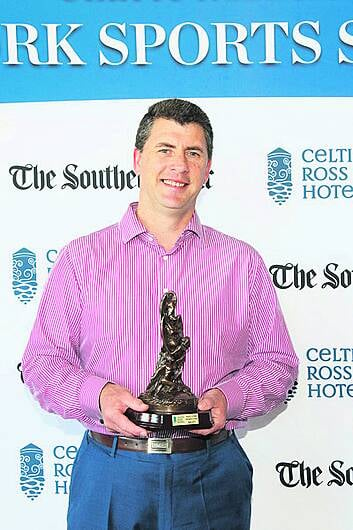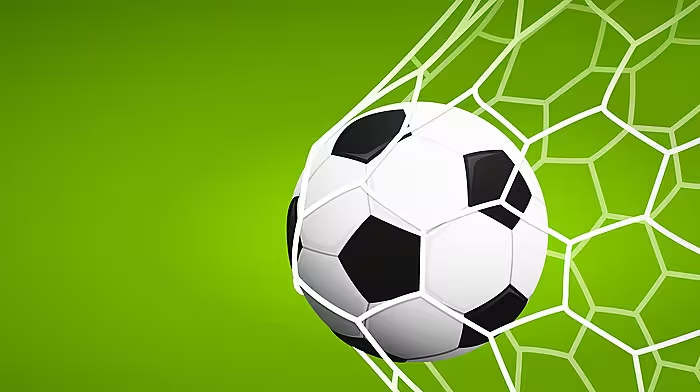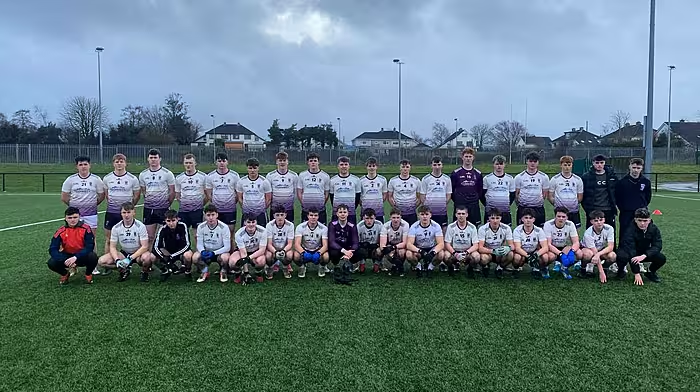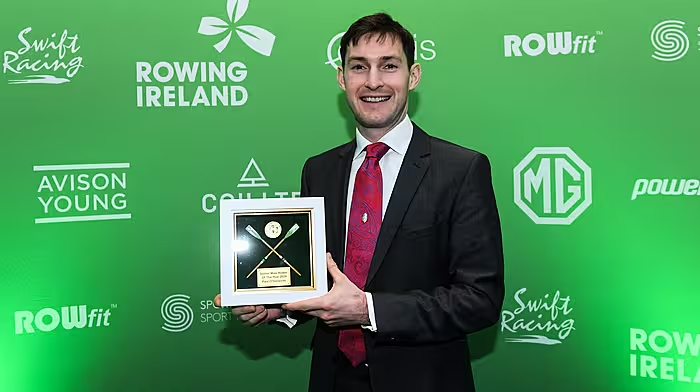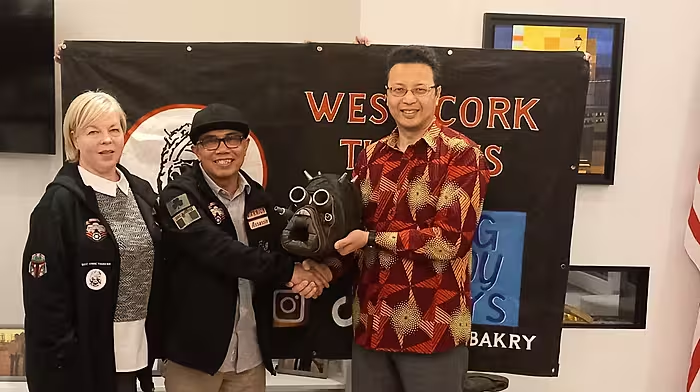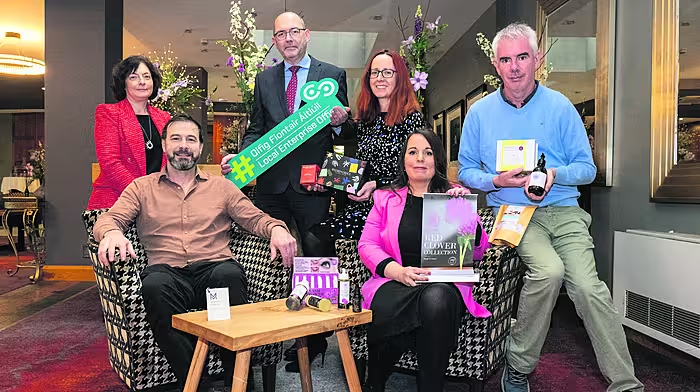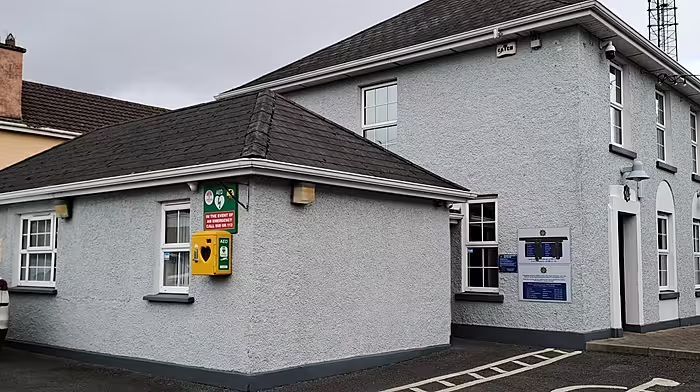Transplant athlete Mike Keohane from Rosscarbery won the recent Celtic Ross West Cork Sports Star of the Month award after bringing home three medals from the world games in Malaga.
Transplant athlete Mike Keohane from Rosscarbery won the recent Celtic Ross West Cork Sports Star of the Month award after bringing home three medals from the world games in Malaga. He shared his remarkable story with Kieran McCarthy
*****************
HIS voice crackles a little bit.
‘I'm a bit emotional right now,' he admits, but he has good reason.
Flanked by his nearest and dearest, his family and friends, Mike Keohane (43) picked up the Celtic Ross West Cork Sports Star of the Month June award last Wednesday evening for his medal-winning exploits at the 21st World Transplant Games held in Malaga.Â
His wife Deirdre (Dee) sits just metres away, his fitness trainer and strength and conditioning coach Maurice Moore is there too, standing in the background, Â as is Denis McSweeney of Rosscarbery Steam Runners AC, and many more are there in support.
The award presentation was a special occasion for the Rosscarbery man in what is a landmark year for him; this Christmas Day will mark ten years since he received his life-saving liver transplant, a day that both changed his life and gave him life.
***************
Mike was 12 years old when John Treacy won a silver medal in the marathon at the 1984 Olympic Games in Los Angeles.
That's Mike's first memory of the Olympics and it stuck in his mind.
Even back then, and like all kids his age, he dreamt of representing Ireland on the world stage.
And he did, but it's not how he thought it would play out.
‘I didn't realise I would get an opportunity to represent Ireland as a transplant athlete and I wouldn't have wished it to be in any other team; it's been an amazing experience,' Mike said.
He was in action in the British Transplant Games last weekend, winning four medals, but it was his exploits at the world games that garnered him his West Cork Sports Star monthly award, as he landed home to Ross with three medals from the world stage: two silvers in the men's 5km racewalk (personal best time, 28.23) and the discus, in his 40-49 age category, and a bronze in the darts triples event along with Charlie Ryan from Cobh and Dubliner Lenny Ryan.
These were Mike's first world medals, having previously brought home medals from European Transplant Championships held in Dublin, Croatia, Poland and Helsinki.
Already, he is targeting the Europeans next year, the worlds again the following year, Newcastle in 2019.
‘I have never been fitter or better, my energy levels are amazing, I don't have a pain or an ache,' he said, touch wood
‘I haven't been in hospital for one day since my transplant, which is ten years this Christmas.'Â
***************
Mike didn't have it easy by any stretch.
Quite the opposite.
Late in his teens he underwent an operation for ulcerative colitis, a bowel disease, and after this, leading into the Christmas of 1992, the then 19-year-old became very jaundiced.
‘Obviously it was something to do with the liver because I was jaundiced,' he explained.
He was sent to St Vincent's University Hospital on January 25th 1993, and two days earlier there they had carried out the very first liver transplant in Ireland.
‘After a number of weeks I was diagnosed with a condition called autoimmune hepatitis which is my immune system attacks my liver and tries to destroy it. They told me at that time that I would need a transplant,' Mike said.
‘As you can imagine, it was new to them too and I thought that it was something that would happen to somebody else somewhere else.Â
‘Having to hear the words “You will need a liver transplant at some stage†was quite frightening and to be honest I tried to ignore it for as long as I could.Â
‘That's why I went back playing football and soccer because I wanted to prove that I was okay.
‘I wasn't very keen on having a liver transplant at that stage, I remember having a chat with my doctors and I asked was there any other way around this. They did try different medications and got the condition under control. The liver has a great capacity of regenerating itself and coming back, and that is what happened after a few months.
‘I kept attending the transplant clinic because they made it very clear to me that this was a temporary measure.'
Life returned to normal after that. He felt much better, much stronger, and within 12 months he was back playing football with Carbery Rangers.
***************
He'll never lay claim to being a world-beater on the football field but Mike held his own.
A Rosscarbery man, now married to a Rathbarry woman and living in Rathbarry, Ross will always be home.
His wife Dee is Deputy Principal of the local Mount St Michael Secondary School where Mike has been a football coach for the past 24 years, and he also lined out for Carbery Rangers in the past, mainly the 90s.
‘We didn't have a senior team at the time, we had a junior 1 team and I made that team, and I played for three or four years, in a couple of West Cork finals, so I was good enough to play but I always knew that the energy levels were not there,' he said.
‘Towards the end of the 1990s I knew I had to drop down to the junior 2 team; it was less training and less games so I was able to prolong playing.
‘My last game for Carbery Rangers was in November 2004, we lost the junior 3 West Cork final, and just after that, coming into Christmas of that year, I was very, very sick. I wasn't eating.Â
‘Within a couple of months I was in hospital in Cork and I had a very big operation because with the liver condition that I have there was a lot of internal bleeding. That operation I had in 2005 was one that I never got over. For the next two years I struggled along with it and in the summer of 2007 I started going down very quickly, I went into Vincent's hospital in November and it was quite obvious that my time had run out.'
Mike knew in the summer of 2007 that he was in trouble.
By then he couldn't straighten up properly, he was hunched over due to the bad condition of his liver, and he went from early 2005 to the middle of 2008 without sleeping lying down once.Â
‘The outlook wasn't great,' Mike admitted.
‘When we got into December, and I had been in hospital for a while by now, they decided that I needed a transplant; time had run out for me.
‘At the time I needed a transplant there were 35 people on the list ahead of me but I went straight to number one.
‘They came into me on Thursday, December 13th, and I remember my consultant, Professor John Hegarty, said to me, “Time has run out, we need to get you a liver nowâ€.
‘I remember asking him, “what do you mean I need one now?â€
‘He told me I had eight weeks to get a liver or I will die.
‘There were cameras following me at the time for a programme called Surgeons, for RTÉ, and they captured all this. I remember asking the surgeon off camera, “When you say you have eight weeks to get me sorted, what does that mean?â€
‘He said, “Eight weeks is as much as you haveâ€.
***************
Eleven days later, it was Christmas Eve. Mike was out of hospital and back home in West Cork.
While Dee and himself were going to collect the turkey for Christmas dinner, they were going over Barley Hill, a couple of miles outside Rosscarbery, when the phone rang: it was a Dublin number.
‘I knew immediately what it was. They said, “We have a liver, get to Dublin, your transplant will take place tonightâ€,' Mike recalled.
They drove back home, got ready, and with Dee's brother in law at the wheel, they left Rosscarbery at 12.30pm that afternoon and, thanks to a Garda escort all the way to the capital, Mike walked in the door of St Vincent's at 2.55pm.
That evening, around 4pm, the life-saving liver transplant got the green light.
‘I went down to the theatre at six and I came out around four or five on Christmas morning,' he said.
‘It was a challenging enough transplant.
‘When I said about not being able to stand up or lie down, they could not find my liver for the first hour and a half of the surgery. It was stuck to everything, was covered up and had shrunk down to nothing.
‘Whereas I was thinking that I had only been waiting 11 days and had another six weeks the surgeon told me after I had no more than six days.'
The operation was a success. He watched TV on Christmas morning in intensive care, came off the ventilator and was able to breathe by himself within 24 hours.
But four days later his body rejected the liver.
‘They scale rejection from one to nine, I had suffered a rejection eight,' Mike said.
‘It took five weeks of very heavy anti-rejection tablets to try to see if it would start up again and work itself, and luckily it did.Â
‘It was a very challenging four weeks up there, I was very sick but once my body got over the rejection and accepted the liver, my recovery was almost instant. Within ten days I was home.
‘Once the liver started to work my energy levels shot up completely.'
‘Nine weeks from the date of my operation, and six of those were in hospital, I was back training teams.'
***************
Ten years on and Mike is still going strong, he is living proof that there is life after a transplant – and his medal haul at the various transplant games highlights that.
It was his wife Dee that encouraged him to check out about the transplant games, even though he did his best to ignore it at first.
‘That's not where I wanted to. I wasn't too enthusiastic about it,' he admitted.
‘But once I got involved and I met up the Irish team, I must say – and I have been involved in All-Ireland success coaching football teams with the school and had great success with football in Ross – but this is the greatest sporting life that I have enjoyed, it's been amazing.
‘All the people we have met on the Irish team and on teams around the world, transplant sport has opened up a whole new avenue for us.'
Since he competed at the 2010 European Championships held in Dublin, his first since his liver transplant, Mike has won numerous medals in various disciplines: shot putt, badminton, darts, 5km walk and discus.
And there's more to come, he insists.
‘There was a friend of ours who had a liver transplant a few years before me, she went to the games and unfortunately she passed away two years ago. Her whole approach was that she was going to do this for as long as she could. She competed in the games six months before she died,' Mike said.
‘I haven't completed all my goals. I have won two silver and a bronze at the world games, I would like to win gold. Every year we go away I am trying to throw further, race walk faster and if there is a medal there, that's great – but the message is about organ donation.
‘This sport is no different to any other sport, we all want to push ourselves, we all want to get better, come back stronger.Â
‘I'm only hitting 44 years of age, I'm hoping I have another 20 years left, and I have never ran faster in my life that I am running now. Twenty years ago if I was this fit I would have been a much better footballer!'
His coach David Sweeney in Dublin has played a big role in Mike's sporting success, as has Maurice Moore in Ross, who has made Mike fitter, stronger and faster, while his wife Dee is the glue that holds it all together: she's been his coach, is his travel agent, his best friend and the person who stood beside him in the darkest days and always gave him hope.
That's why Mike was emotional as he accepted his Celtic Ross West Cork Sports Star of the Month June award, because he's walked a testing road that very few have.
‘On times like this, and in good occasions, I think of the donor, and there is always a certain degree of guilt,' he said.
‘I know very little about him because we are not allowed know anything but I did find out by pure accident that he was a young married man who had got married a year earlier.Â
‘I feel a certain degree of guilt when I'm here accepting an award or getting on a plane and flying off to Malaga and places like that competing because somebody did lose a life – and I am very conscious of that. So when I use the word celebrate, I used it loosely because we're not jumping around the place but we are acknowledging what I received.
‘This is why it's very important for me to live as fit a live as I can and enjoy every minute I have because I am only here because of the generosity of somebody else.'
 ***************
Every Christmas Eve morning the first thing Mike does is leave home for a 5km run in memory of his donor – that was the day that he lost his life and the day that changed Mike's life.
‘After that we would have mass in the house and I always put a reflection in The Southern Star every year as well; that's the little piece that I can do, to thank him and his family for what they did for me,' he explained.
***************
‘I got ten extra years that I didn't think I would have,' Mike reflects.
‘It was one of these things that happened. I got it, I lived it and I've dealt it with, I have fought back and I haven't let it get the better of me.Â
‘It's still there, I still have the condition, I am still on medication to make sure that it doesn't flare up and attack this liver.Â
‘The likelihood is that I will need another liver transplant at some stage. I have a new liver but I am still living with the condition and still living with having a transplant as well which means anti-rejection tablets every morning and every night; they have to be taken without fail.
‘Even though I am ten years down the line it's an on-going process to look after the liver I have got – and I do that. And the best way I can do that is by being fit, and the fitter you are the healthier you feel.
‘That's where the games come in – they give you a focus, a reason to get up every morning and train. I know what I am training towards, it pushes me on to train and the benefit is that I will probably live a longer life because of the fitness schedule that I have.'
Mike's life story, from then to now, is inspirational, as he looked death in the eye – but thanks to organ donation, he was given a second chance that he has grasped and lived to the full in honour of his donor.
By competing in the transplant games he is help raise the awareness of organ donation, and as a result of that he has found himself among the medals for the Irish team on the international stage.
And the Rosscarbery Steam Runners AC club member has now been honoured in his own backyard by the region's most popular awards scheme; a fitting honour in this special year. Â

